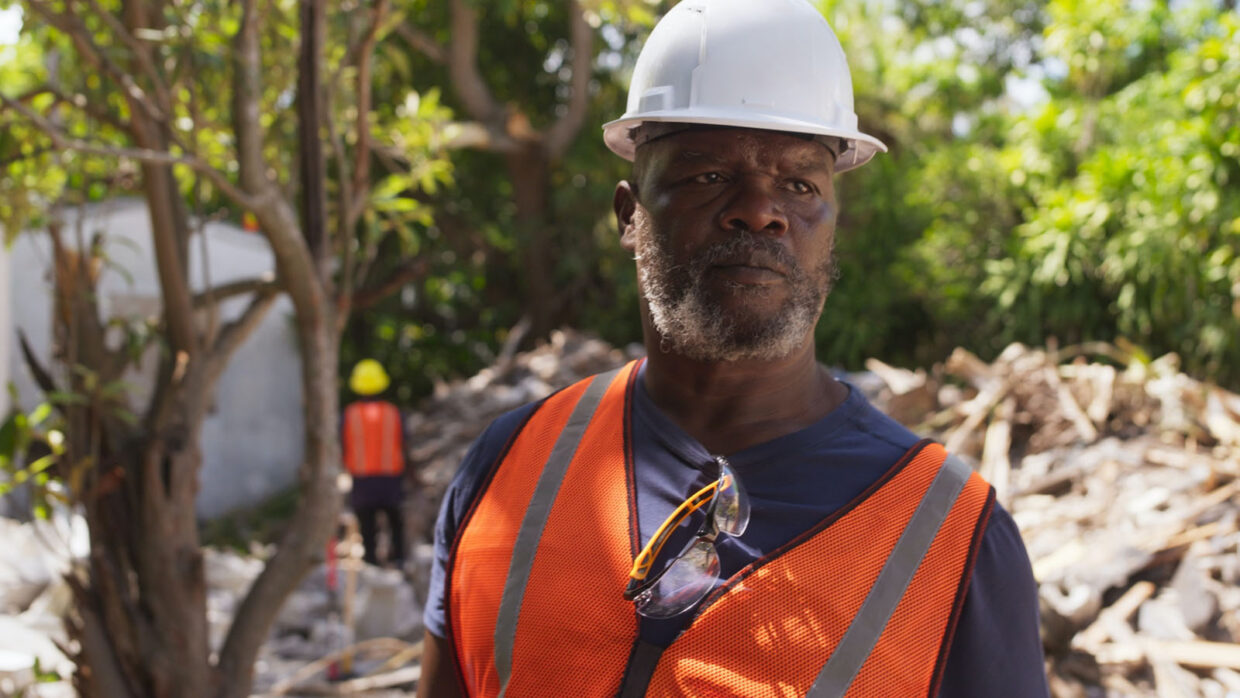 Back to selection
Back to selection
Critic’s Notebook: Monica Sorelle’s Miami-Set Debut, Mountains
 Mountains
Mountains Monica Sorelle’s debut feature Mountains is currently screening at the Seattle International Film Festival, with its final screening tomorrow, May 14, and then on the festival’s streaming platform from May 20 – 27.
Mountains, the debut feature by Miami-based filmmaker Monica Sorelle, opens with a Haitian proverb: Dèyè mòn gen mòn—behind mountains are mountains. We hear the brutal clamor of a towering demolition crane—perpetually under construction, Miami, where Mountains is set, has no mountains but these—as it rakes the shingles off a roof. The patriarch of the family at Mountains’ center is Xavier (Atibon Nazaire), a construction worker who’s been tasked with the demolition of houses in Little Haiti, his own neighborhood, to make room for impending redevelopment. So the thunderous refrain of the crane returns again and again. The machine is at once precise and dinosauric: it stops and starts, scratching at and cumbersomely sliding off its targets, taking surrounding branches along with it, creating casualties of the flora and a mess of the terrain. In Mountains, the bellicosity of the crane is lucent, and so is its clumsiness.
The real-life forces behind Little Haiti’s real-life dismantling—ravenous developers keen on inland property sitting at an altitude high enough to dodge the immediate effects of sea-level rise—aren’t given precedence in Mountains. The film is made with care, and Sorelle doesn’t care for these figures. Her love is reserved for the people operating the crane by necessity, the people living and loving in the neighborhood her mother in settled after relocating from Haiti. Cinematographer Javier Labrador’s camera lingers, meanders: There’s the evening light on Xavier’s face as he naps. There’s his wife Esperance (Sheila Anozier), placidly guiding us through Little Haiti, past “For Sale” signs, ushering schoolchildren on a crosswalk. Their son, Junior (Chris Renois), in the periwinkle light of dawn, shrinking into the driver’s seat, lest his father discover how late he’s returned home. The warm, lilting gossip shared among women at an afternoon communion; little girls napping on a relative’s bed at the same party, encircled by purses. The Creole-language radio Xavier listens to on his morning drives to work: “For me, I don’t want to die in the United States. I need to be buried at home, near my family, near my friends, in my country.” The gentrification of Little Haiti—in Mountains and in life—moves at trick-like speed: look away for a moment and a familiar space is supplanted, erased. Redevelopment at the expense of a neighborhood’s inhabitants is an atemporal offense, the way it truncates lifetimes spent in one community, under a particular roof, surrounded by specific beloveds. Displacement dislodges people from their homes, and out of time. Mountains moves at a deliberately languid pace, full of interludes that stretch the days and illuminate the tenderness the family so plainly bestows upon each other.
Mountains draws its title both from the aforementioned proverb and a story Xavier shares with Junior following a tense argument. “When you’re in Haiti, you have time to do whatever you want,” he says. “There were times I would go to the beach and stay there all day, until sunset. And then I would look at the mountains very far away. And I would ask myself: What’s behind those mountains? Here, when you look outside, all you see are buildings.” Sorelle, who is a recent recipient of an Independent Spirit Someone to Watch Award, wrote the script with Robert Colom—Mountains’ producer—after the two of them watched a demolition worker in the redeveloped, once predominately Puerto Rican Wynwood neighborhood, leave work and cross the street. He was heading home, to a much smaller part of the community that is, happily, still Puerto Rican for now. Miami’s neighborhoods are like this—filled with vestiges that belie and defy attempts to destroy them. They are living palimpsests. Xavier has a quiet, pressing desire to purchase one of Little Haiti’s newly renovated homes, but his attempts to claim it are essentially rebuffed. By design, the house is not for him, though it’s his work and his hands that make its existence possible. Why would a neighborhood’s future not make room for its present?
In Sorelle’s gentle hand, these losses hurt—the disappearance of a chatty neighbor and the appearance of a younger, whiter, mannerless one; the eventual teardown of Xavier’s dream home. But they don’t fester: Mountains is about what remains. Esperance and Xavier’s worries dissolve, night after night, into the sweetness of their embrace. The clamoring of the omnipresent crane is extinguished by a dreamlike Ra-Ra procession by the film’s end. “But, my love, you have to see what’s happening outside,” the perspicacious Esperance implores Xavier, in her delicate way. “You see this house? This is a building. Home is home. Anywhere.”
